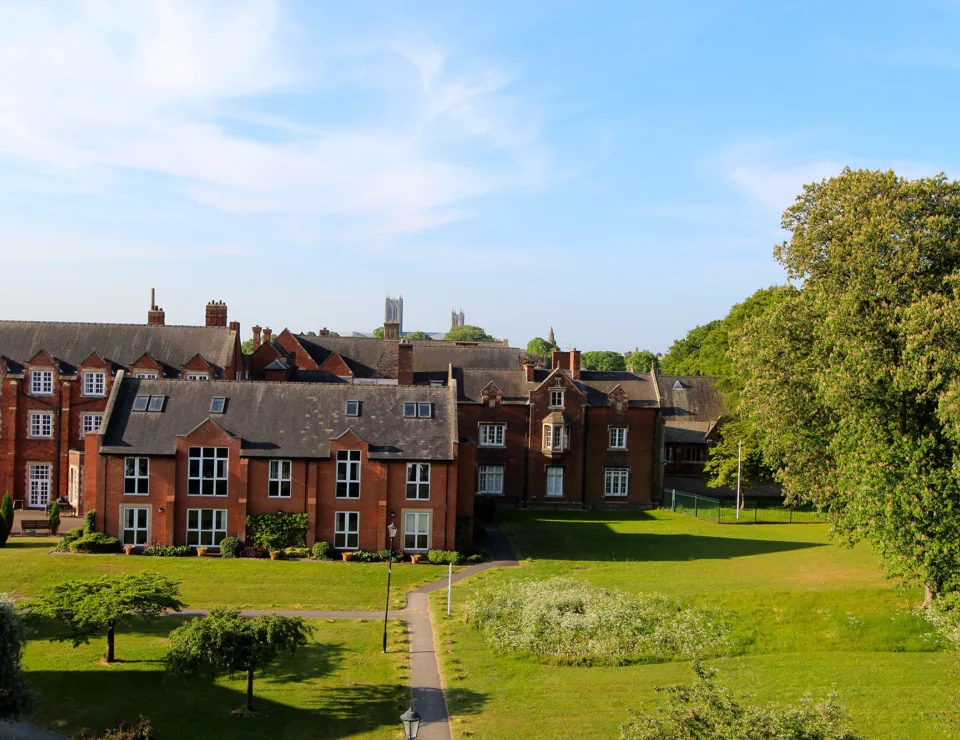A new Chapter as Lincoln Bishop University
Strategy 2030 signals a new chapter in this institution’s history, as Lincoln Bishop University.
In commencing this new chapter, we continue to be inspired by the contribution of Robert Grosseteste, Bishop of Lincoln (1235-1253), who was considered to be one of the most prominent and remarkable figures in thirteenth-century English intellectual life. Drawing on all that Robert Grosseteste inspires, the University seeks to expand its reach and deepen its impact by raising its profile nationally and internationally. As Lincoln Bishop University, our new name confidently locates the University in the City of Lincoln and, as Lincoln Bishop, we proudly reflect our history and heritage whilst now placing our educational contribution into a contemporary strategic context.

Anne Frost, Chair of Council
The strategic context for Strategy 2030

Professor Andrew Gower, Vice Chancellor and CEO
Strategy 2030 is an intentionally positive response to the challenges and opportunities for Lincoln Bishop and for the communities the University seeks to serve. With continuing real-terms reductions in core funding compounded by inflationary cost pressures, it has never been a more financially challenging time for the UK higher education system. Alongside these financial challenges, there are persistent inequalities within the diverse communities of Greater Lincolnshire, combining with megatrends nationally and internationally including climate change, technological disruption and demographic shifts, with an aging population.
It is within this challenging strategic context that the University has developed Strategy 2030 as an expression of its institutional commitment to positive change. The University is committed to working collaboratively, using its expertise in education and training, research and innovation to serve the common good by advancing social and economic prosperity. We seek to play a greater civic role within our communities, expanding access to higher education, doing more to support our students to thrive in life and work, and adapting as an institution to ensure our financial sustainability.
In harnessing the opportunities of devolution - for what is a new era for Greater Lincolnshire - Strategy 2030 signals the University’s energy in promoting social mobility and supporting economic growth. We will create a pipeline of graduate talent into education, health and business services, including the heritage industry; and be similarly committed to enabling students to gain higher-level skills of universal relevance for employment. Through the pursuance of research and knowledge exchange we seek to stimulate innovation in learning and teaching, pushing back the boundaries of knowledge to enable new understanding. In addition, the Lincolnshire Open Research and Innovation Centre (LORIC) will engage with education, business and community partners to address challenges and opportunities with research-informed ideas and insight.
Our approach to developing Strategy 2030
It is with a spirit of pragmatism that the University has approached developing Strategy 2030. It has, arguably, never been a more important time in the life of this University to define its distinctive contribution to meeting local priorities whilst addressing national and global challenges.
Strategy 2030 is the result of extensive consultation with students, staff and external stakeholders and informed by an evidence base produced by the University’s Lincolnshire Research and Innovation Centre (LORIC). Strategy 2030 is inspired by our Values and designed to be a practical guide to decision-making that informs our direction of travel, pace of change and alignment with our Mission and Vision. We are ambitious as a university community. However, given the strategic context, the temptation of setting lofty aspirations is resisted in favour of stretching but deliverable Goals and Objectives. This Strategy is designed to deliver the positive change we are steadfast in achieving, in collaboration with partners, by 2030.
Working within an increasingly regulated higher education system, the University’s Strategy is fully aligned to the requirements of the Office for Students. It is also closely informed by the needs and ambitions of the main beneficiaries: namely students, staff and a large range of external stakeholders and partners within education, as well as employer representative bodies, businesses and community organisations.

For Lincoln Bishop University, people are everything. Our ability to deliver Strategy 2030 will be enabled by the profound importance we place on human connection and collaboration both within and beyond the university community.
Thank you for your interest in Strategy 2030. We look forward to working with you in the months and years ahead.
